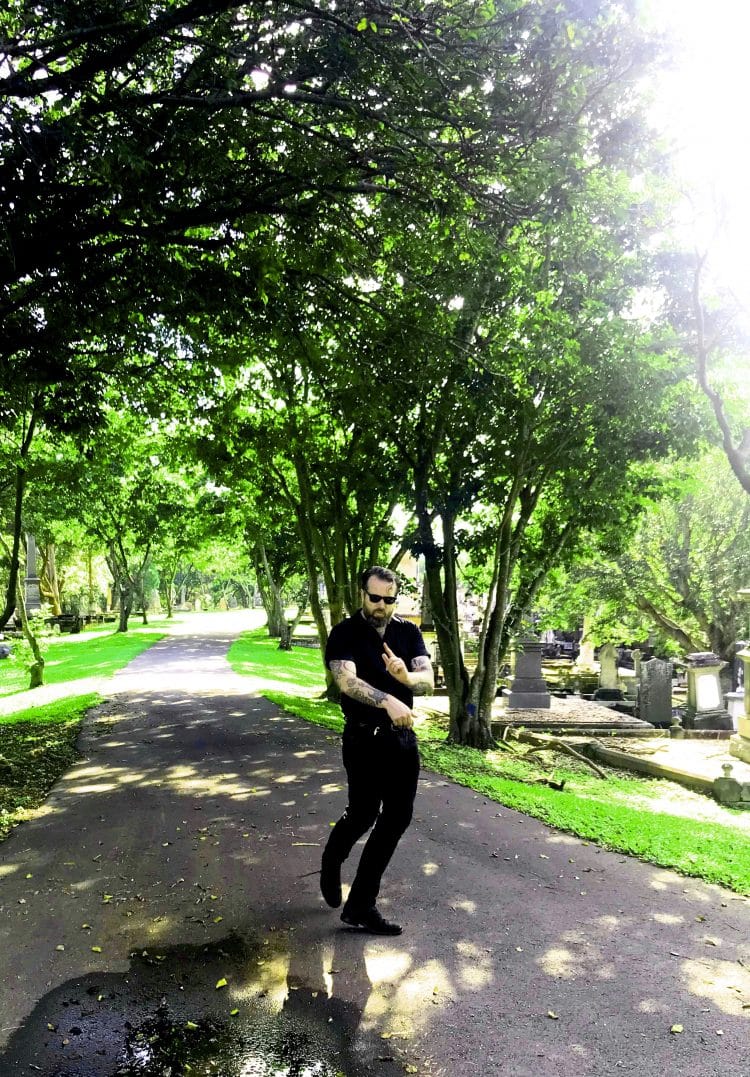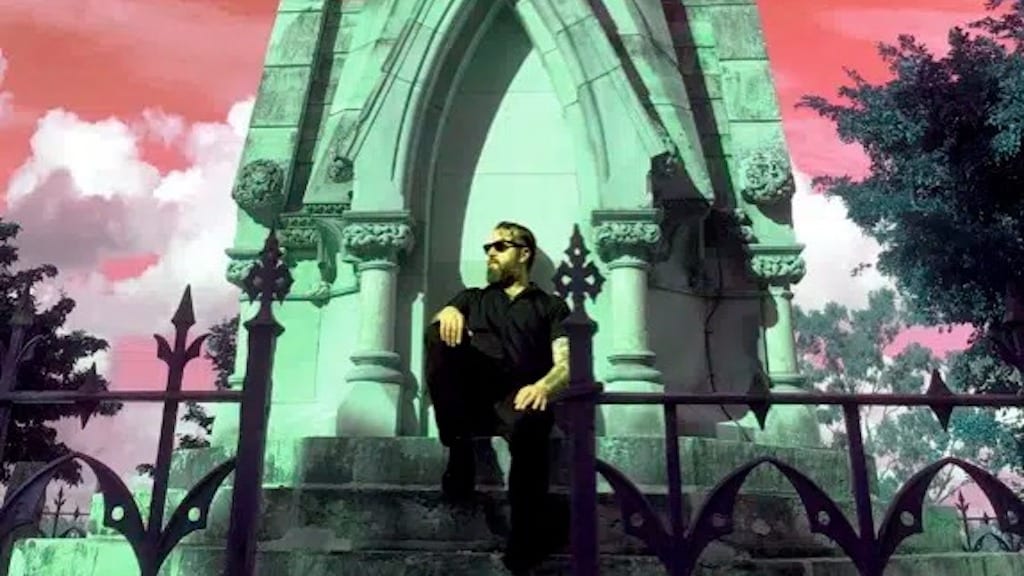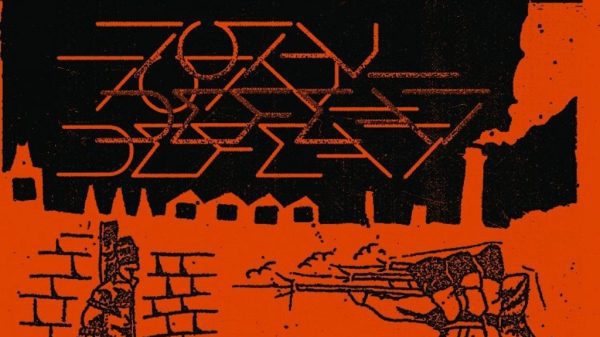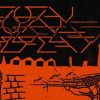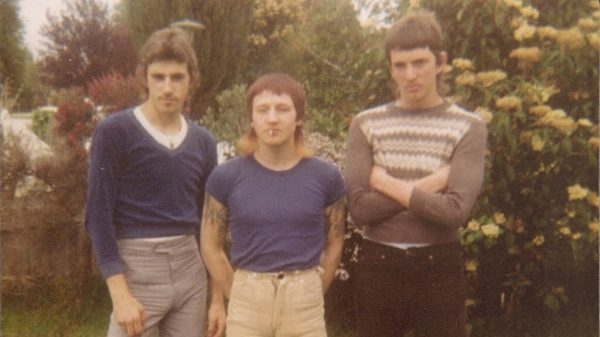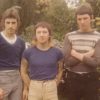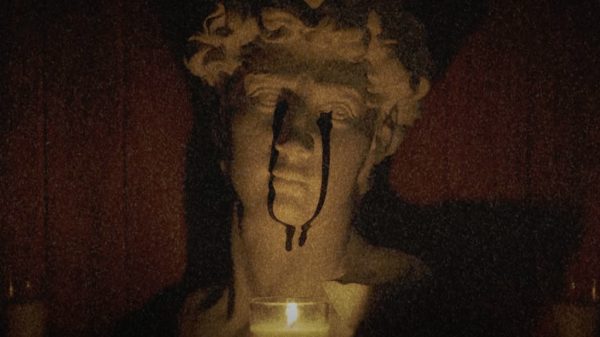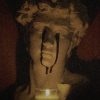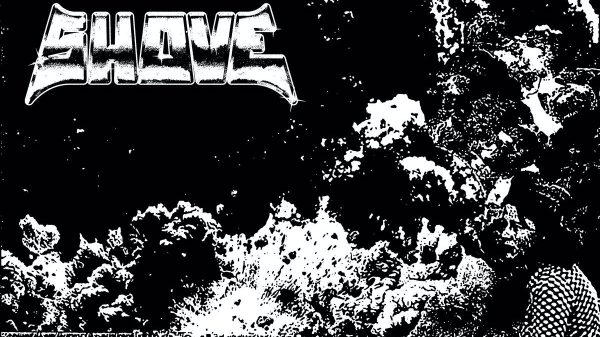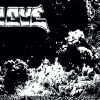King Dude had to die so that TJ Cowgill, the man behind King Dude, could continue to live, grow and change—because while King Dude might be TJ Cowgill, TJ Cowgill is not King Dude, at least entirely. What began in 2010 as a bedroom project while Cowgill was still playing in the black metal band Book of Black Earth, soon became his main focus, as time and distance between members effectively put an end to Cowgill’s career playing black metal. What started as a dark folk project grew into an ever-expanding career that encompassed neo-folk, early country and blues, death and gothic rock, and, on occasion, even some lighter shades of surf and rhythm and blues, that focused on heady esoteric themes surrounding love, sex, magick, and, of course, death. Openly Luciferian, Cowgill knew at the beginning that if he was to be the master of King Dude, he would also intentionally have to end it on his own terms, which he has done on his excellent ninth and final King Dude album Death. I sat down with Cowgill to discuss the birth and death of King Dude, and everything in between.
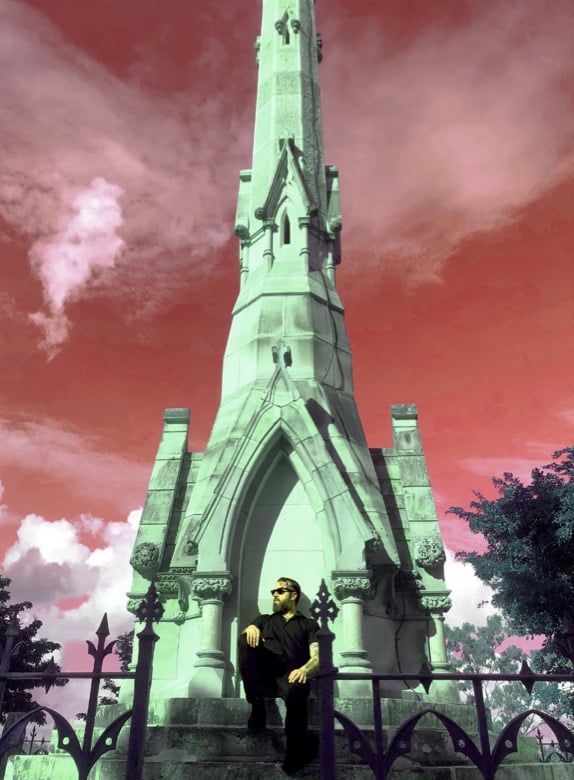
Well first of all, how are things in the ‘hottest place on earth?’
TJ: It’s crazy, I mean the weirdest thing that I never knew is that when you go to the Southern Hemisphere is that the moon is upside down from where we are used to because it’s tidally locked to the Earth. For some reason, it didn’t occur to me, and I was in quarantine in Sidney for two weeks, which is also very surreal, and I started to feel like I was going crazy, and then the second to last day I was in quarantine it was New Year’s Eve. I looked out the window to see the fireworks display and it happened to be a full moon and that’s when I noticed it. I’d been alone for two weeks and the moon is upside down and I just thought for a second that I was starting to lose my mind.
But it is amazing down here, to tell you the truth. It gets kind of a bad reputation because of snakes and spiders and things like that, but those are really minor details in a really wonderful place with really great people. Obviously, my wife is here and that’s why I’m here, and maybe I see it through rose-colored lenses because of that, but I’m deeply fond of Australian people, I think they are wonderful.
This might be a social media-induced misperception, but you’ve always seemed a bit nomadic. Is that a fair assessment?
TJ: Well, yes and no. I’ve always had Seattle be my home base forever and I’m from there more or less, I’m from Washington state. It really does feel like home, but I’ve lived in other places and toured in bands since I was 19…I think I turned 21 in Bakersfield, California. Which is like the worst place if you’re not from Bakersfield. To not know anyone in Bakersfield and to turn 21 in Bakersfield in a gas station is pretty lame. So yeah, I’m totally comfortable with moving around. What’s funny is I have motion sickness, sometimes pretty severely. Like on a plane I will at one point on a long enough flight get pretty ill. When we do bus tours and I sleep on the bus, I wake up with vertigo. It’s like my karmic duty to tour so much and just get it out of my system and get used to it. I always figure it out by the end, and I sort of did, but then covid came along and that was the end of the touring. I was like this is the best tour, and then it was over, I guess we stop now.
Obviously, I want to talk about the end of King Dude, which from my understanding was planned long ago, but before we get to that, I’d like to go back to the beginning, which from my understanding was started as a literal bedroom project.
TJ: Yeah.
And there were some correspondences with Kim Larsen (Of the Wand & the Moon, Solanaceae, Saturus) that inspired you and got you going.
TJ: Absolutely.
I’d like to talk about your relationship with Larsen, because it seems to have run throughout your career and kind of expand out from that to address what you see as your place within the sort of ‘neo-folk’ context.
TJ: I met Kim Larsen in what is the most naïve way possible, which is going all the way back to the MySpace days…I almost feel like it was the 90s, but it wasn’t, it was like 2006 or 7, and I was making this bedroom music and I think we just called it King Dude. My roommate would record it and he had to name the file and he was like ‘what do we name it?’ And I was like ‘King Dude, I don’t care.’ His girlfriend Mary heard it and said, ‘it sounds like Current 93 or Death in June.’ I had never heard those bands and I seriously said, ‘those are shitty band names.’ (laughing). Like on their face, if you had never heard the music and you just heard the band names, you’d go ‘nah, I don’t want to listen to that. Current 93? That sounds stupid. Oh, it’s a magick thing, ok. Death in June? What is that like an emo band?’ But then you hear the music and it’s not that.
That’s how I found that whole genre, which was amazing to me at the time because I’d never really heard of it, and I love folk music. I’m a huge fan of British folk music, you know traditional stuff and the proggier stuff of the 70s. I worked in a record store that sold a lot of it shortly before that, so it was just weird to not know about this little pocket of folk music, so I did a deep dive. There was a Wikipedia page, and so there was a list of all the neofolk bands in 2006 and I just went through and started listening to them. I hated most of them, except Of the Wand & the Moon.
Looking at it from the perspective of a complete outsider, which I was and still pretty much am, to me the best band was Of the Wand & the Moon, then and now. So, I went to MySpace and I had these shitty recordings and I sent them to Kim on MySpace messenger. It turns out he just happens to be a very very kind person and really interested in music. He’s an incredible songwriter and just incredibly kind and so just in chatting with me he told me he liked it and was encouraging and asked me to do a split with Solanaceae, so it’s his fault I’m here. He was very encouraging.
We still share music all the time and chat often, or as often as we can, but he is still so encouraging. He makes me want to make music. He’s like a magical person in that regard.
As to the other part of your question, I don’t really see myself as part of the neo-folk community at all. I mean I often just see myself as an outsider. That’s not to say that I don’t like them, it’s just that I don’t fit in all the time with them, nor share their interests. I mean we do share some interests, and nothing controversial necessarily, but there are certain things that I find about it that are just a little dumb. A lot of it is great, and I hate to bring up the bad part about neofolk and focus on that, but there is this sort of — and this is the same with heavy metal — this purist way; this ‘it has to be this way’ garbage approach, which on one hand makes it terrible, but also makes it really good, because there are rules to it and then it’s really fun to see those boxes get ticked. It’s like a really good metal band, you go ‘ok, they got the hair, they got the generic Satanic thing, they are doing something very ignorant, this is great, it sounds good, and the distortion levels are right, and there’s nothing too creative or weird about it.’ It’s like that with neo-folk too. The only thing that it allows in mutations is when they permeate organically. You can’t just grab a neo-folk project and say, ‘let’s make a hip-hop neo-folk thing.’ Everyone will hate it. You could do what Death in Rome has done though, which is hilarious.
I was going to ask you about them.
TJ: Oh, I love them. I think there is a cheeky, or devilish prankster, element to all of it. It’s the same thing I love about heavy metal, and the same thing I like about Boyd Rice and stuff like that. They are taking a piss, they are trolls, they were the trolls before internet trolls were a thing. I don’t like internet trolls that are just cruel, but I think if they are clever, everyone likes it. It’s the trickster, it’s fun.
I think Death in Rome has perfected that. They’ve made taking a piss into true meaningful art for its own sake.
TJ: Yeah.
You’ve mentioned metal, and you started out in metal. Speaking for myself as someone who would call themselves a metalhead, and knowing there are a lot of dudes similarly situated who love your work as well, how do you see yourself in relation to that scene, and do you have any interest in doing anything in the future metal related?
TJ: I love heavy metal. I think playing it, and playing it poorly for so long, will really break your heart about wanting to play it (laughing). But just because I did something specific that I don’t want to do again, doesn’t mean I won’t ever play heavy metal again, there are lots of different ways to do that. I’m more interested these days in heavy rock. I think it’s just because of being older. Blast beats are really difficult for me and too much screaming bothers me, but of course, I’ll always love heavy metal and the classics like Bathory will always be in my heart and it always inspires my music too.
As far as getting back on the road as a metal band; no, probably not ever. You’ll probably be really surprised by what you hear from me once King Dude is dead. I’ve already recorded some of it. It’s very strange. I guess it would be like 70s heavy rock stuff. It might sound like that to some people. I’ve been told it also sounds like surf music. Like demented over-driven 1960s surf music, which is interesting because that is what I grew up with and really loved before black metal, so the transition from surf music to metal was very real for me. The Ventures are from Tacoma, Washington, and knowing there’s a hometown surf band, even though no one surfs in Washington state, is still just amazing and a huge inspiration to me.
There will be some weird psychedelic shit too. I’m interested in psychedelic music, I’m interested in soundscape stuff, I’m interested in music. It’s not as if I’m going to stop doing music, I’m just going to do music in other directions without the…well, King Dude has to die. Everything dies.
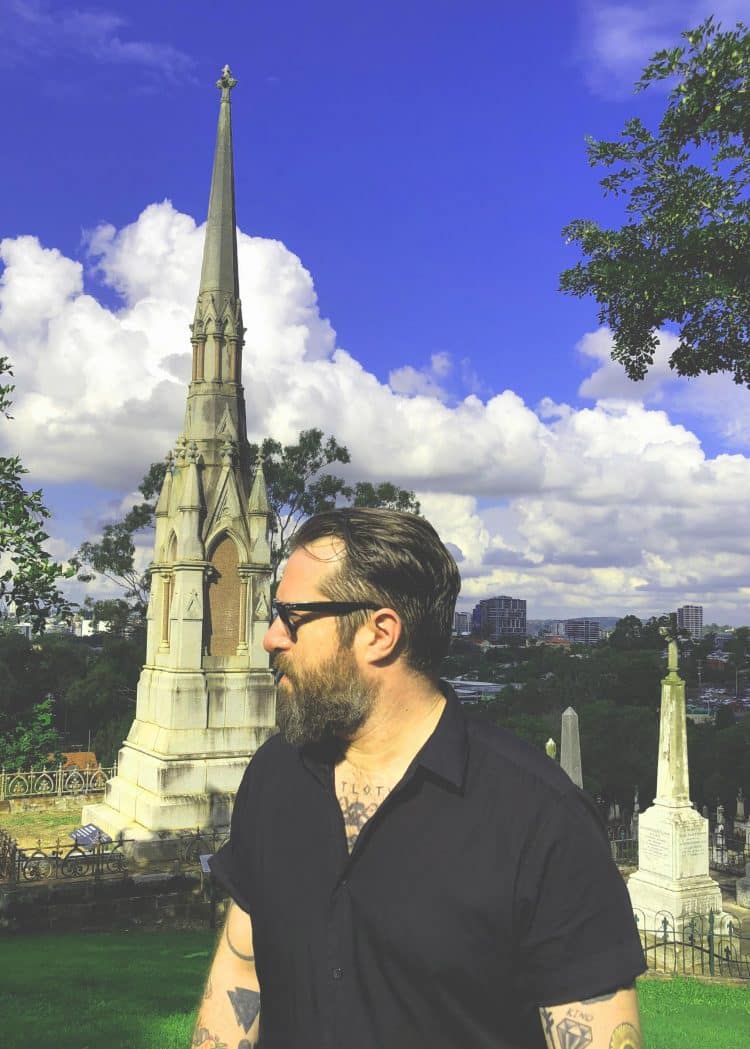
Let’s go ahead and get into that. Why does King Dude have to die?
TJ: Because Everything dies, everything has to die. When I started King Dude, I didn’t know that I would be ending it right away, but within about two years I did. This has been planned since I released Burning Daylight. The album cycle got a little thrown off. I did an album called Fear, I did an album called Love, I did an album called Sex, so I planned to end it with Death, and then Covid threw a wrench in when I wanted to end it. But that’s ok, I mean anyone who has a ten-year plan is already borderline crazy, especially if they think it’s going to work out perfectly to the day. It’s a like a construction project that’s six years behind because they are hard and difficult, big, long things.
I was studying a lot of rock and roll from the 50s and 60s and none of these bands last long, except the worst ones. They are categorically terrible for the majority of their career as the result of not dying. If they were to end, they would be so much better, and we could enjoy them more. I think people who make music sometimes feel like they won the lottery if people like it, and they don’t want to slay the goose that is laying the golden eggs. They don’t realize they are the goose. They don’t have to literally die, but they have to make a change. They have to kill what came before.
Someone like Bowie realized this perfectly. He transformed himself throughout his career and recreated himself over and over again. If you don’t destroy your idols, including ending your own thing, the people that you created to enjoy it by manifesting the work that they enjoy, will destroy you. They invariable have to, one way or the other. So do it yourself. It’s sort of like a spree killer who is murdering a bunch of people and when the cops are closing in, he just shoots himself.
I told people this forever — well, people that were close to the project, in the band, and other people — and they would always go ‘yeah right, no you are not.’ Even up until recently, record labels and those folks were like ‘are you sure that’s a good idea,’ and trying to talk me out of it…as if you could talk somebody out of that, a ten-year plan (laughs)…’are you sure about the thing you’ve been thinking about for ten years?’ If someone tells you they’ve been planning something for ten years, probably don’t try and talk them out of it.
Was there anything specifically about making this album where you knew this was it, this was the one to end on?
TJ: No, because I knew going in it would be the last. It’s definitely the hardest album I’ve made. Not necessarily because of musical stuff, but more because of the world stuff. It was just a difficult time to make an album with other people. There are other people that worked on the album. Shannon Funchess from Light Asylum sings on a track, and she’s wonderful, a wonderful singer, and a good friend of mine. I had to go down to Portland to record and she didn’t want to go into a studio over Covid concerns, which is understandable and so…well, people like to make out that Portland and Seattle are just these infernos of lawlessness, like it’s “Escape from New York,” and it wasn’t that bad, but it still wasn’t fun at that time. It was a difficult time to work. We did it in October, which wasn’t as bad as the summer, but there was just a lot going on obviously.
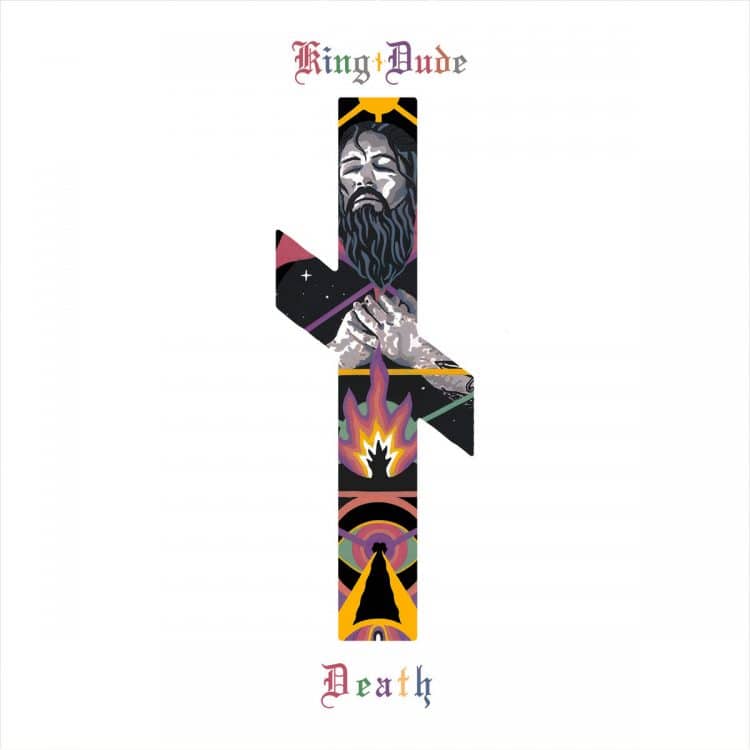
Well now that King Dude is dead, I’d like to go back through your work and discuss it, but first I want to turn to a big part of what has informed it, particularly the occult. I read in an early interview that you did that when you were younger you did copious amounts of LSD and ended up practicing magick unwittingly.
TJ: Yeah, isn’t that wild?
Then eventually that turned into an actual discipline?
TJ: I feel like my relationship with the occult or magical practice has been quite natural. I imagine it’s sort of how it is for everyone, doing rituals before they realize they are doing them. Nobody taught them to, but you are doing it anyway before you know what you are really doing. The thing with the acid thing, I mean taking LSD expands your consciousness. It’s like the Yahweh superhighway. Taking it at a very young age of 15 was kind of strange and I’m not sure that was a very good idea, but I’m definitely sure it has affected my consciousness because you are dipping into other realms.
But yeah, taking LSD and then trying to disappear in a mirror and then learning years later that it’s an actual ritual, trust me I did not know about that when I was 15. It was weird, very weird, but maybe it’s natural because maybe that’s just the shit you would expect to do in that particular conscious realm, which is more of a shared consciousness realm, I think.
It’s not a realm I think a lot of magickal practitioners focus on, they tend to focus more on inner realms, and that’s fine too, you should do both, but there is something very cool about going into that shared consciousness state. When you take LSD, and btw, I’m not necessarily advocating for taking it, it’s not an easy thing like marijuana or alcohol to take, obviously, but when you take it and you seem to trade consciousness or you switch to some other consciousness where you understand everything, but you can’t explain it, because the words are wrong, even though you understand…it’s almost as if your subconscious takes control of the wheel and your motor function consciousness is in the back seat and everything becomes very intangible. As I said, it’s the Yahweh superhighway, but you don’t retain it. When you come off a psychedelic experience you are like ‘I feel like I had everything figured out,’ but that’s why you can feel like a lot of spiritual weight has been lifted, but not really know why.
I think through meditation, and my practices later, that’s when I began to have those experiences with more retention of why that spiritual weight was lifted without being high or using a hack. I mean you could call meditation a hack, and it is in a way, but you retain more of what it is to know what that other realm is.
To explain my religion is always way too difficult and would take way too long. I really should try and work this out and get it in a nutshell, but there are so many great mysteries in the world that we should explore spiritually through magickal practices. Whether that be chaos magick or a more traditional thing. If you go to the Catholic Church, or you join the O.T.O., or if you join a coven, I think it’s good for people to do this and I think it’s natural. It’s a part of us. When we neglect it, we can get confused and sick about our souls. I do believe we all have that, and I do believe we all share that. It comes from one source that we all return to. That would be my Luciferian belief – the True Soul. The things of this world are not as important as that, but also it doesn’t really care for us, we will return to it anyway. Sort of like Vishnu having his dream on the lotus leaf where everything happens in that one time, in that one dream; like breath from a god that doesn’t even know we are here and then he will inhale us back in. We are part of one breath, and everything that’s ever happened is in that small of a moment, so it’s not that important.
But be good. To me, it almost gives you a reason to be better, and not to be some tyrannical monster because we are all chained together in this — so why would you want to hurt other people, which just hurts yourself?
Let’s talk about your evolution. I have a theory about your work, which is that it’s a reflection of the spiritual journey. It’s obviously yours, but it’s also incredibly personal for a lot of people, including myself. Frankly, your music pulled me back to myself and got me through my own spiritual crises. Fear came out right as I was going through my own dark night of the soul, and I connected with that album because it seems to be about that dark night of the soul, doing the shadow work, and making friends with your demons. To my ears, it was a watershed album that you had been building up to and after that, there was more measured evolution and growth as one would expect after that cataclysm.
You are dealing with spirituality in all of these records, something not many people really are, and you are really dealing with it from the standpoint of a true practitioner and a truly personal way, which is why I think it resonates. You started out with Book of Black Earth, which is just straight-up Satanism, and it feels like you have progressed and evolved beyond that, and btw, I’ve been there too. Actually, we met at a show one time in Chicago where we were talking about these things and you said to me something about the ”New Satanic Era,” and I said ‘yeah, that’s where we are at now, right?’ and of course, that didn’t entirely materialize. Now we are in some sort of Ragnarök chaos.
TJ: Yeah, I don’t know what happened. When did we meet?
It was on the “Songs of Flesh & Blood” tour.
TJ: I feel like that’s right before we jumped the rails on that timeline and got on a much stranger timeline. But I also kind of really like the timeline. I certainly didn’t see it coming, but I like chaos a lot. I find joy in chaos and chaotic things.
I do too, I’ve made my peace with Loki.
TJ: (laughs) Totally!
But I do think there was a vibe back then.
TJ: Yeah, it felt like there was an age that was kind of dawning that was different than the Aquarian age. It wasn’t just some new age, PC, peace movement thing. It wasn’t evil either.
No, it felt liberating.
TJ: Yeah, and sort of an age of reason, I thought. Of course, we aren’t now, I mean Kali Yuga, right? How long is that supposed to take? That’s like forever. I mean FOREVER. So, of course, we are thinking ‘yeah we are on the upswing,’ but no, we are still deep deep deep in the crotch of Kali Yuga. (laughs) You know? I think we are just face-pressed in the taint, right next to the butthole of Kali Yuga.
That is definitely going in the article. Ok, back to my original long-lost question, given all that, it seems like you have evolved as well, and your music is a reflection of that. Can you go into your own spiritual evolution over those years? It seems Luciferian is the appropriate descriptor, but it feels definitely turned away from the early Satanism.
TJ: Yeah, a lot of times I was trying to spread a message of love through a lot of my work to people who are maybe not accustomed to hearing that in any way, shape, or form, because of their satanic beliefs or their general misanthropic nature. I found that through my music I got to talk to specific people about really important things that they weren’t normally getting. It made me a bit like a preacher in disguise, like a covert operative for religious beliefs.
My own journey is so strange. I think of my life, well, I think of all our lives, in the terms of the Major Arcana from the Fool to the Magician. On the way, I don’t ever know where I’m at, and by default, I say, ‘well I’m the Fool,’ because it’s the best place to be, because I want to learn. I don’t think I know everything, or know much of anything, really, so it’s really important that I remain foolish in a way about these subjects. It sounds weird to say when Luciferianism does cherish wisdom, a spiritual wisdom. I don’t think I’m foolish in a negative way, but in a naïve way, in a childlike way, which is how I approach my faith. So, yeah, it does transform and gets strange sometimes.
There was a time around 2016 when I strayed away from magic. I didn’t practice anything at all. I stopped meditating. Stopped dreaming anything profound. Something changed. But in 2018 I got back on my bullshit pretty hard. I turned 40, and when I turned 40 I decided to be like Alan Moore. When he turned 40 he told all his friends “I’m going to be a wizard.” What a fucking birthday party that must have been for everybody. They were like ‘cool, thumbs up, guess I should have got you a wand.’
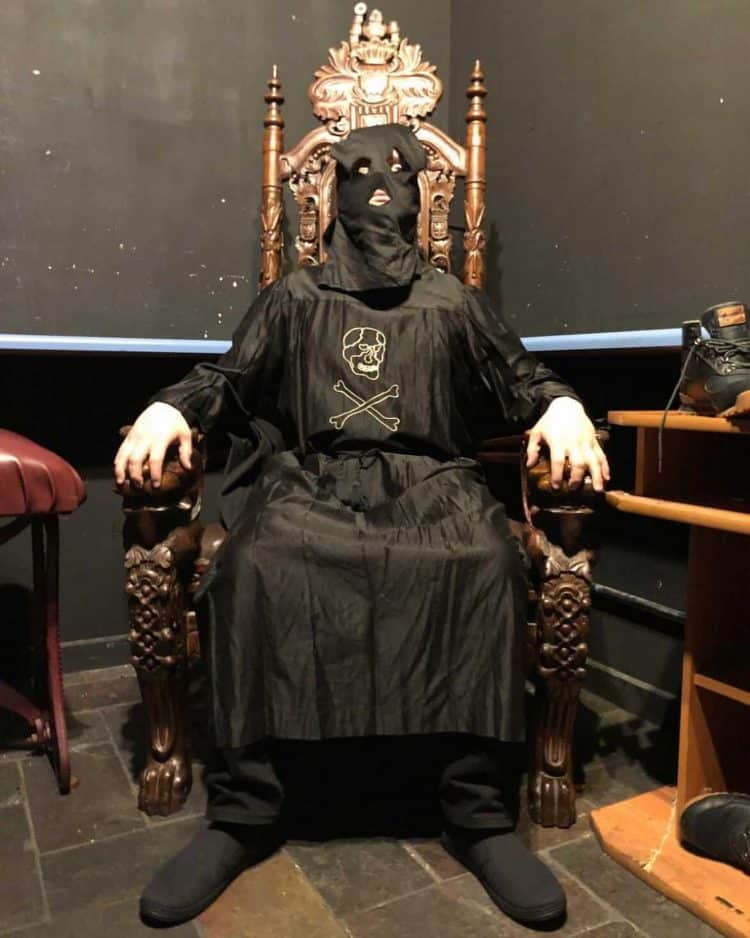
I thought I should do that too. I was going to do it sober and do this monk thing, not have sex, starve myself, I was going to do all that. I did it for like two days and was like ‘this is stupid, this isn’t for me, I’m not a monk, I’m a normal human, I’m down here with everyone else, I don’t live in some fucking abbey, I’m not going to go into a cave in the Himalayan mountains and sit in the dark for a year, no I’m not doing that, that’s not for me.’ But my Will manifested itself and said, ‘you’re going to start doing magick again.’ The next day I just started to research John Dee and Edward Kelly and read about the Enochian stuff. After about four or five hours I get this email from my landlord, who I had been having problems with because I was playing music in the apartment, and they were making it difficult for me to do that, saying ‘hey I’m not going to be your landlord anymore, I’d like to introduce you to your new landlord, her name is Dee Kelly.’ I was like ‘yeah, ok, I’m doing magick again’ (laughs).
Jung called those synchronicities, Christians might say ‘take it as a sign from God,’ I don’t know what it is, but I listened to it, and so I followed it. I feel like it’s something telling you that you are on the right path. That you are aligned with the mystical path, and that’s all it is, just a sign to keep going. It’s not telling you what to do, it’s just saying you are walking in the right direction.
And that we may not see the end until the end.
TJ: Right totally. It’s strange too because John Dee and Edward Kelly are talking about this host of guardian angels that could be demons as well. They were always so confused by that and suddenly the one major problem in my life was just vanquished when I started studying somebody that was looking into guardian angels, so I just was like ‘fuck it, whatever is with me, demon or angel, you’re my fucking friend now again, and let’s work together again.’ Since then, it’s been good, everything has been great.
